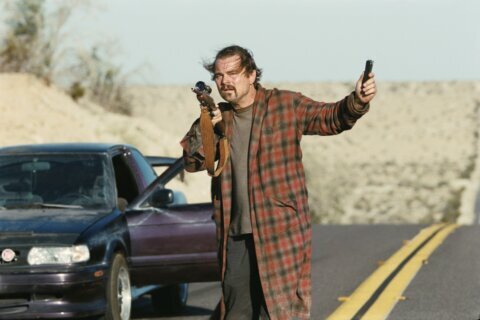Jason Fraley, WTOP Film Critic
WASHINGTON – Hollywood saluted its own elite forces Sunday at the Oscars. Meanwhile, moviegoers crowned “Act of Valor” as the weekend box office champ with $24.5 million. As far as opening weekends go, that puts it between “Jarhead” ($27.7 million) and “Behind Enemy Lines” ($17.1 million).
Still, “Act of Valor” more closely resembles the military recruitment videos that screen as movie theater ads before the trailers even start, jacking us up with patriotic images of “Citizen Soldiers” performing heroic deeds.
“Valor” is just like that, but instead of killing a few minutes before the movie, you’re forced to kill two hours — and it’s all you get. I suppose there are worse ways to pass time than by killing terrorists with the most elite forces known to man.
The film actually began as a real-life recruitment video for the U.S. Naval Special Warfare Command, then evolved into a feature-length “fiction” film. Such a transformation raises all sorts of questions about the role of government in a free enterprise like filmmaking, which Washington Post critic Ann Hornaday examined as a “slippery slope” toward propaganda.
“Act of Valor” follows a group of U.S. Navy SEALs as they save a kidnapped CIA agent and pursue an Islamic extremist named Abu Shabal (Jason Cottle), who’s financed by his old Jewish colleague, Christo (Alex Veadov). That’s the plot. And by plot I mean a series of missions loosely strung together by what can only generously be called “scenes.” You have heard of “scenes” before, no? In “Act of Valor,” they’re written like visual porn — mere setups to the next round of visceral pleasure.
The script also features very little character development. Simply having a character say, “We don’t want ‘Black Hawk Down,'” isn’t enough to avoid repeating the perils of riveting action with poorly drawn characters. Screenwriter Kurt Johnstad may have scored a hit with “300” (2006), but it’s now time for him to go back to his “screenwriting Bible” and have a “come to Christo” moment.
The mediocre writing isn’t done any favors by the non-actors reading the dialogue. Remember, these are actual Navy SEALs playing the parts. It’s a thrill to watch in action, but listening is a chore. There’s a reason actors act and servicemen serve. “Act of Valor” reminds us of the divide between “Citizen Soldiers” and “Citizen Kane.”
Of course, there are always exceptions, whether it’s wounded vet Harold Russell winning an Oscar for “The Best Years of Our Lives” (1946) or Jimmy Stewart rising to the rank of Colonel in World War II. Nine times out of 10, though, George C. Scott will play General Patton better on screen than Patton would himself, just like General Patton will outperform Scott on the battlefield. Sure, Scott could look the part, master the mannerisms and strut convincingly into war. But his army would be swiftly destroyed, just like the SEALs’ acting debuts will be destroyed by the critics.
Should we cheer these men for their real life heroism, or judge their performances against cinema’s best? In the words of Jack Nicholson’s Colonel Jessup, “We want them on that wall, we need them on that wall,” but do we need them on screen?
The plus side of all this is that the action scenes are practically flawless. They are tense, shocking and arguably the most realistic I’ve ever seen. SEALs slowly rise out of the water, barely rippling the surface. Gunner boats whip around river bends, mowing down all comers. And night vision goggles enable precision maneuvers, delivering kill shots with pinpoint accuracy.
Considering these sequences are based on actual missions, you will leave the theater in awe of these brave men and women, particularly the reenactment of Lt. Michael Monsoor’s Medal of Honor deed. If there’s one time to provide a movie “spoiler,” it’s to draw attention to a real-life story that can’t be shared enough. Monsoor selflessly dove on a grenade to save his buddies. He is a real American hero.
We the viewers have the humbling experience of living vicariously through such eyes, thanks to a series of point of view shots from the SEALs’ perspective. As civilians, this viewpoint feels like a video game, a “first person shooter” like “Call of Duty.” Even the film’s other characters get POV shots, like the spinning one of a woman being rolled up inside a carpet.
Such camera work is impressive, as is the connection between a SEAL’s high tech “palm camera” and a terror hostage having holes drilled into her hands. Such Christ imagery appears intentional, even if it’s not as obvious as “Viridiana” (1961) or “M*A*S*H” (1970), nor articulated throughout like “Cool Hand Luke” (1967), “The Godfather” (1972) or “E.T” (1982). “Act of Valor” flirts with actual symbolism, but the moments lack an overarching directorial vision from start to finish. The film plays out like an editor’s vision — not that of a director.
Part of this has to do with the fact that there are two directors, Mike McCoy, who last year directed a TV movie about Hot Wheels, and Scott Waugh, a stunt man on “Spider-Man” (2002) and “Bad Boys II” (2003). Co-directors rarely create a single, cohesive vision. Again, there are exceptions — Bruckman and Keaton on “The General” (1927); Cooper and Schoedsack on “King Kong” (1933) — but even classics like “Gone with the Wind” (1939) suffer from multiple directors. The first half is clearly George Cukor, a homosexual who identified more with Scarlett O’Hara, while the second half is totally Victor Fleming, a macho man who led Clark Gable to his “frankly my dear” triumph.
For this reason, “Act of Valor” fails the academic test of the “auteur theory,” the notion that each film carries the distinct signature of its filmmaker. The only signature on “Valor” is that of Uncle Sam, drafting us with the command, “I want you to like this movie,” without bothering to write enough drafts of the script.
This is the same Uncle Sam that Christo calls trapped between the opposing forces of a Newton’s cradle device. You’ve seen the device before — a series of metal balls hanging in a row. If you pull a ball from one end, then let it go, it swings back to hit the others, sending another ball swinging off the other side. When that ball returns, it hits the row of balls back in the other direction, and so on and so on, in an ongoing transfer of energy.
So goes the job of film criticism. The metal balls represent the “star” rating system, with two opposing forces hitting from either side: Art vs. entertainment. When art hits too strongly without entertainment value, a star gets knocked off in one direction. When “entertainment” hits too hard without artful vision, a star flies off in the other direction. The best of films master both.
If you want to grab a few beers and watch some action scenes with your buddies, go for it. You can swat the Newton’s cradle off the table entirely, like the U.S. interrogator does in the middle of Christo’s speech. But if I were to swat it away, I wouldn’t be doing my job. It would be an insult to all the movies that have achieved both art and entertainment in the past, like “Platoon” (1986), “Full Metal Jacket” (1987), “Saving Private Ryan” (1998) and “The Hurt Locker” (2008). It would also insult our hope for future films like Kathryn Bigelow’s “The Hunt for Osama Bin Laden.”
Thus, “Act of Valor” unintentionally sums up its own merits as a movie. The film honors the exclusive heroism of the SEALs by closing with the quote, “Damn few.” Likewise, only a few movies deserve to be called “great,” and “Act of Valor” isn’t one of them.
Damn few, indeed.
The public gives it a 6.5 on Internet Movie Database. The critics give it a 30 percent on “Rotten Tomatoes.” Calling it from both sides of The Film Spectrum, I’m giving it 2.5 out of 4 stars.
Read more from WTOP Film Critic Jason Fraley by clicking “Fraley on Film” under the “Living” tab above, and check out his blog, The Film Spectrum.
(Copyright 2012 by WTOP. All Rights Reserved.)








